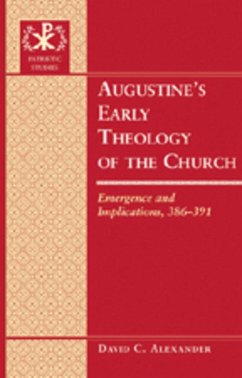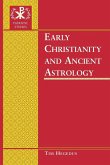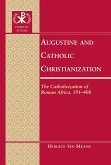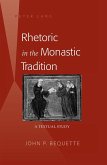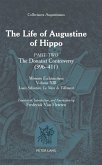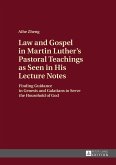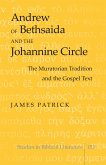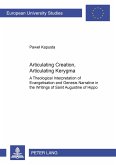The nature and development of Augustine's understanding of the church between his conversion (386) and his forced entry into the clergy (391) provides an essential lens to understanding this seminal period of transition and the foundations of his future ecclesial contributions. Even so, most studies of Augustine's ecclesiology bypass this period, starting with the clerical Augustine (post 391). In fact, research on the 'young' Augustine and the Confessions too often stalls over debates between his neo-Platonic or Christian orientation, focusing on dichotomies in Augustine or an individualistic Augustine too rigidly labeled. This book helps fill these gaps and provides a case study supporting arguments for continuity between the 'young' and the clerical Augustine. A careful chronological textual approach to Augustine's early Christian years demonstrates how his ecclesiological thought began during this period and comprised a core component of his first theological synthesis. The emergence of his ecclesiological ideas was intimately intertwined with his overall personal, religious, philosophic, and theological development. As such it is crucial to our biographical and theological understanding of the great North African and will be of interest to specialists and students alike of Augustine's development, Confessions, mature ecclesiology, and the late antique world.
«David C. Alexander has written a work of immense learning and applications about a period in Augustine's early writing of very great significance for Augustine's later theology, and which greatly needed to be written. Alexander's thesis, with which I agree, is that Augustine's conversion was brought about by contemplative experiences of a markedly Platonic character, in which communal worship and active participation in the life of the Church played only a limited part. The Cassiciacum discussions were therefore essentially individualistic, being concerned with the manner in which a Christian can raise himself to the Vision of God by an intellectual effort, like the Vision of Ostia. In the years following Cassiciacum, Augustine became increasingly an apologist for Christianity and increasingly concerned himself with the 'rudes ac simplices', those humbler believers who were not intellectuals but followers of Christ who held the faith and were nourished by the sacraments, the people to whom Augustine was later to minister as priest and bishop of Hippo. In the period 387-391, however, his desire was to be a teacher of the Church and Christian apologist rather than a priest, especially in the increasingly monastic atmosphere of the Thagaste community. Alexander traces these developments with considerable thoroughness and great erudition. Alexander's narrative and three appendices to the study illustrate the increasing use of technical ecclesiastical terminology in Augustine's treatises, culminating in the 'De Vera Religione', which can be seen as ushering in the great writing of his episcopate. I have been much impressed by Alexander's work and welcome its publication.» (Gerald Bonner, Emeritus Reader of Theology, University of Durham, England; Distinguished Professor of Early Christian Studies, Catholic University of America)
«David C. Alexander's study of Augustine's early understanding of the church will take its place among a handful of essential works for interpreting the development of the great African philosopher-theologian during those still somewhat hidden years between his conversion to catholic Christianity in Milan and his conscription into the ranks of the clergy in Hippo (Annaba in modern Algeria). The key sources are Augustine's own writings during those years, which for the most part do not enjoy the accessibility of his more celebrated later works. This monograph provides a careful text-based analysis, exposing the emergence of a stronger thread of church-focused reflection and activity than most scholars - including Augustine's most eminent modern biographer, Peter Brown - have hitherto reckoned with. Here we have a work of solid intellectual sensitivity, illuminating the formative years of Western Christianity's most powerful teacher.» (David F. Wright, Professor Emeritus of Patristic and Reformed Christianity, University of Edinburgh, Scotland)
«David C. Alexander's study of Augustine's early understanding of the church will take its place among a handful of essential works for interpreting the development of the great African philosopher-theologian during those still somewhat hidden years between his conversion to catholic Christianity in Milan and his conscription into the ranks of the clergy in Hippo (Annaba in modern Algeria). The key sources are Augustine's own writings during those years, which for the most part do not enjoy the accessibility of his more celebrated later works. This monograph provides a careful text-based analysis, exposing the emergence of a stronger thread of church-focused reflection and activity than most scholars - including Augustine's most eminent modern biographer, Peter Brown - have hitherto reckoned with. Here we have a work of solid intellectual sensitivity, illuminating the formative years of Western Christianity's most powerful teacher.» (David F. Wright, Professor Emeritus of Patristic and Reformed Christianity, University of Edinburgh, Scotland)

